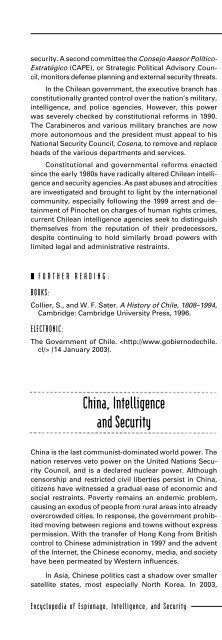ENCYCLOPEDIA OF Espionage, Intelligence, and Security Volume ...
ENCYCLOPEDIA OF Espionage, Intelligence, and Security Volume ...
ENCYCLOPEDIA OF Espionage, Intelligence, and Security Volume ...
You also want an ePaper? Increase the reach of your titles
YUMPU automatically turns print PDFs into web optimized ePapers that Google loves.
China, <strong>Intelligence</strong> <strong>and</strong> <strong>Security</strong>security. A second committee the Consejo Asesor Político-Estratégico (CAPE), or Strategic Political Advisory Council,monitors defense planning <strong>and</strong> external security threats.In the Chilean government, the executive branch hasconstitutionally granted control over the nation’s military,intelligence, <strong>and</strong> police agencies. However, this powerwas severely checked by constitutional reforms in 1990.The Carabineros <strong>and</strong> various military branches are nowmore autonomous <strong>and</strong> the president must appeal to hisNational <strong>Security</strong> Council, Cosena, to remove <strong>and</strong> replaceheads of the various departments <strong>and</strong> services.Constitutional <strong>and</strong> governmental reforms enactedsince the early 1980s have radically altered Chilean intelligence<strong>and</strong> security agencies. As past abuses <strong>and</strong> atrocitiesare investigated <strong>and</strong> brought to light by the internationalcommunity, especially following the 1999 arrest <strong>and</strong> detainmentof Pinochet on charges of human rights crimes,current Chilean intelligence agencies seek to distinguishthemselves from the reputation of their predecessors,despite continuing to hold similarly broad powers withlimited legal <strong>and</strong> administrative restraints.❚ FURTHER READING:BOOKS:Collier, S., <strong>and</strong> W. F. Sater. A History of Chile, 1808–1994,Cambridge: Cambridge University Press, 1996.ELECTRONIC:The Government of Chile. (14 January 2003).China, <strong>Intelligence</strong><strong>and</strong> <strong>Security</strong>China is the last communist-dominated world power. Thenation reserves veto power on the United Nations <strong>Security</strong>Council, <strong>and</strong> is a declared nuclear power. Althoughcensorship <strong>and</strong> restricted civil liberties persist in China,citizens have witnessed a gradual ease of economic <strong>and</strong>social restraints. Poverty remains an endemic problem,causing an exodus of people from rural areas into alreadyovercrowded cities. In response, the government prohibitedmoving between regions <strong>and</strong> towns without expresspermission. With the transfer of Hong Kong from Britishcontrol to Chinese administration in 1997 <strong>and</strong> the adventof the Internet, the Chinese economy, media, <strong>and</strong> societyhave been permeated by Western influences.In Asia, Chinese politics cast a shadow over smallersatellite states, most especially North Korea. In 2003,Encyclopedia of <strong>Espionage</strong>, <strong>Intelligence</strong>, <strong>and</strong> <strong>Security</strong>North Korea reactivated a nuclear reactor <strong>and</strong> announcedthat it possessed the capabilities to produce nuclear weapons<strong>and</strong> intercontinental ballistic missiles. The developmentarose international suspicion that North Korea receivednuclear materials <strong>and</strong> technology from its closestally, China. The Chinese government denies aiding NorthKorea, <strong>and</strong> maintains that it adheres to global non-proliferationefforts. The Chinese intelligence community, however,is reluctant to share information about North Koreawith Western nations, especially the United States.China’s main intelligence agency is the Ministry ofState <strong>Security</strong> (MSS). The Communist Party of Chinadominates the Chinese government, especially the intelligencecommunity. Political espionage within China, <strong>and</strong>on Chinese citizens, is endemic. Government reforms in1983 created the MSS, restructuring the Chinese intelligencecommunity <strong>and</strong> revising the mission of its predecessoragency to account for technological advances inintelligence tradecraft. The MSS utilizes human, signals,remote, electronic, <strong>and</strong> communications intelligence in itsvaried operations. The main mission of the MSS is toprotect national interests <strong>and</strong> preserve government stability.However, the MSS also aggressively targets UnitedStates <strong>and</strong> European businesses <strong>and</strong> factories in a broadcampaign of industrial <strong>and</strong> economic espionage.Chinese military intelligence is divided into operationaldepartments that fall under the administration ofthe central government <strong>and</strong> individual branches of themilitary. The People’s Liberation Army (PLA), China’s defenseforce, maintains trained intelligence, counterintelligence,<strong>and</strong> security forces. The operations of these forcesare highly secret, but most operations deal with domestic<strong>and</strong> regional threats to the government. PLA intelligencealso guards military instillations <strong>and</strong> key assets in thenation’s nuclear weapons program. The PLA Navy has itsown intelligence force, concentrating on surveillance atsea, signals, <strong>and</strong> communications intelligence. The PLAAir Force’s intelligence forces are known as the SixthResearch Institute. Sixth Research conducts intelligenceoperations similar to other military <strong>and</strong> civilian organizations,but is also the primary agency for aerial surveillance.The Second <strong>Intelligence</strong> Department focuses on foreignintelligence <strong>and</strong> espionage against rival nations. Inaddition to monitoring foreign diplomats <strong>and</strong> foreign interestswithin China, the agency also conducts politicalsurveillance of Chinese diplomats abroad. Recently, theSecond <strong>Intelligence</strong> Department received a new m<strong>and</strong>ateto work with the MSS to increase industrial, economic,scientific, <strong>and</strong> technological espionage efforts, especiallyin Western nations.Throughout China there are municipal, regional, <strong>and</strong>national police forces. The Ministry of Public <strong>Security</strong>administers the national police force. A military trainedpolice force, Unit 8341 General <strong>Security</strong> Regiment, providessecurity for government buildings <strong>and</strong> personnel,<strong>and</strong> conducts counterintelligence <strong>and</strong> anti-terrorism operations.The special police force <strong>and</strong> intelligence unit ismaintained by the General Staff Department.189







![The Big Lie 9-11 and Government Complicity in Mass Murder [PDF]](https://img.yumpu.com/50957077/1/190x245/the-big-lie-9-11-and-government-complicity-in-mass-murder-pdf.jpg?quality=85)








